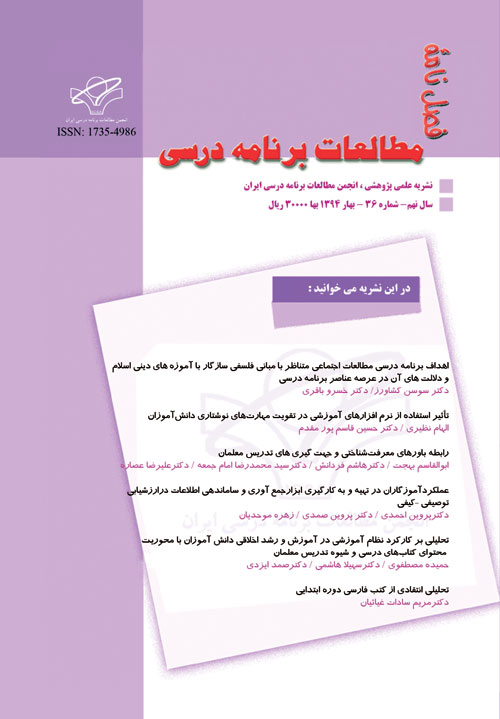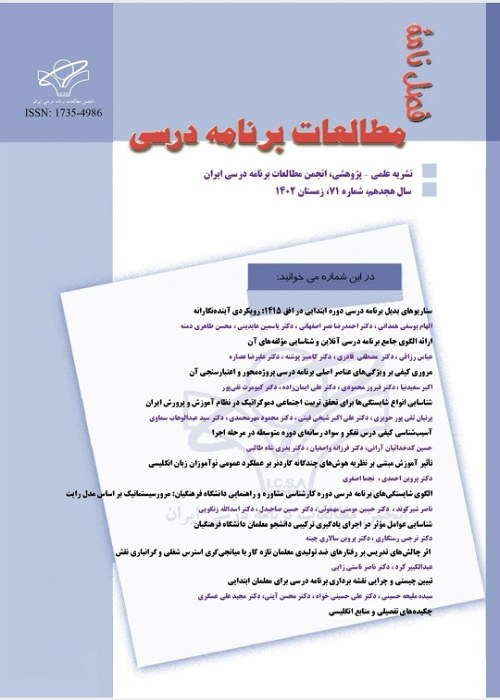فهرست مطالب

فصلنامه مطالعات برنامه درسی
پیاپی 36 (بهار 1394)
- بهای روی جلد: 30,000ريال
- تاریخ انتشار: 1394/03/24
- تعداد عناوین: 7
-
-
صفحات 1-4
-
صفحات 5-30اکثر مطالعاتی که در حوزه علوم اجتماعی در سطح جهانی صورت گرفته مبتنی بر مبانی فلسفی غربی و نوع نگرش آنان به انسان و پدیده های انسانی بوده است. بهره گیری از این دستاوردها، بعضا مغایرت های اساسی ارزشی را در نظام برنامه درسی کشور ایجاد نموده است. لذا، این مقاله بر آن است با نظر به مبانی فلسفی سازگار با آموزه های دینی اسلام و با نظر به رویکرد اساسی سنت گرایی تحولی و واقع گرایی سازه گرایانه به طرح اهداف مرتبط با برنامه درسی مطالعات اجتماعی بپردازد. سپس متناظر با اهداف مذکور، به تبیین اصول مربوط به محتوی، آموزش، اخلاق تدریس، یادگیری و ارزشیابی در برنامه درسی علوم اجتماعی اقدام کند.
کلیدواژگان: برنامه درسی مطالعات اجتماعی، اهداف، آموزه های دینی اسلام -
صفحات 31-44این پژوهش با هدف بررسی میزان تاثیر استفاده از نرم افزارهای آموزشی در تقویت مهارت نوشتاری دانش آموزان پایه سوم شهر کرمانشاه انجام گرفت. روش این تحقیق با توجه به گروه های مورد مطالعه، تجربی است. از میان جامعه آماری، چهار دبستان به صورت تصادفی نمونه آماری را تشکیل داده اند. پس از تجزیه و تحلیل و مقایسه بین میانگین نمرات گروه ها تاثیر آموزش های نرم افزاری در تقویت مهارت نوشتاری تایید شد. نمرات در دو درس املا و بنویسیم فارسی به طور معنی داری افزایش پیدا کرده بود اما در درس انشای فارسی تاثیر معناداری نداشته است. از سوی دیگر آموزش های الکترونیکی علاقه مندی دانش آموزان را به مهارت های نوشتاری افزایش داده است.
کلیدواژگان: نرم افزار آموزشی، املا، انشا، فناوری آموزشی، مهارت نوشتاری -
صفحات 45-70هدف اصلی این تحقیق شناسایی باورهای معرفت شناختی و جهت گیری های تدریس معلمان دوره متوسطه استان خراسان رضوی (14643=N) که در سال تحصیلی 90-89 مشغول به تدریس بودند و تبیین رابطه بین این باورها و جهت گیری ها بود. داده های پژوهش با استفاده از پرسشنامه باورهای معرفت شناختی شومر (1998) و پرسشنامه اصلاح شده جهت گیری های تدریس ساموئلوویچ (1999) از 403 نفر از معلمان جمع آوری و تحلیل شد. نتایج نشان داد 53% معلمان دارای باورهای معرفت شناختی خام و 55% دارای جهت گیری تدریس- محور هستند و بین باورهای معرفت شناختی و جهت گیری های تدریس آن ها همبستگی معنی دار متوسط منفی وجود دارد.
کلیدواژگان: باورهای معرفت شناختی، جهت گیری های تدریس، تدریس، محور، یادگیری، محور، دوره متوسطه -
صفحات 71-96هدف پژوهش، بررسی عملکرد آموزگاران در تهیه و به کارگیری ابزار جمع آوری و ساماندهی اطلاعات در ارزشیابی توصیفی -کیفی است. نوع تحقیق، کاربردی و روش تحقیق کیفی است. جامعه آماری پژوهش، آموزگاران زن مجری ارزشیابی توصیفی پایه های اول، دوم و سوم دبستان های شهرستان فراشبند و حجم نمونه، شامل 12 نفر از آموزگاران مذکور است که بر اساس نمونه گیری تصادفی ساده انتخاب شدند. از روش مثلث سازی برای جمع آوری اطلاعات استفاده شده است. ابزار پژوهش، مصاحبه (نیمه ساختاریافته) و بررسی اسناد (پوشه ی کار، چک لیست یا فهرست وارسی، واقعه نگاری و آزمون عملکردی) است. تجزیه و تحلیل داده ها با استفاده از آمار توصیفی صورت گرفت. نتایج نشان داد آموزگاران از ابزارهای مورد بررسی برداشت نادرستی دارند و به اهداف آن پی نبرده اند. آن ها ابزار مورد بررسی را به درستی تهیه نمی کنند و به کار نمی برند. آموزگاران با کژتابی ذهنی ابزار زدگی و مشکلات تعدد ابزارها روبه رو هستند. از جمله راه حل های پیشنهادی، برگزاری دوره های آموزشی به صورت کارگاهی برای آموزگاران، نظارت بر کار آموزگاران و تعامل آنان با همدیگر است.
کلیدواژگان: ارزشیابی توصیفی، کیفی، ابزار ارزشیابی توصیفی، پوشه ی کار، واقعه نگاری، چک لیست (فهرست وارسی)، آزمون عملکردی -
صفحات 97-120
رشد اخلاقی هدفی است که همواره در تمامی نظام های آموزشی مورد تاکید است. این مقاله به تحلیل کارکرد نظام آموزشی با محوریت محتوای کتاب های درسی و شیوه تدریس معلمان در رشد اخلاقی اختصاص دارد. روش پژوهش کیفی و برای جمع آوری داده ها از روش تحلیل محتوا و مصاحبه استفاده شد. از بین کلیه کتاب های درسی دوره راهنمایی، کتاب های تعلیمات دینی، فارسی، تعلیمات اجتماعی، تاریخ و علوم (15 مورد) انتخاب و محتوای آن ها تحلیل شد. همچنین با 24 معلم در قائم شهر مصاحبه نیمه ساختاریافته انجام شد. نتایج نشان داد کتاب های فارسی، تعلیمات دینی و تعلیمات اجتماعی بیشترین توجه را و کتاب های تاریخ و علوم توجه کمتری را به مقوله اخلاق مبذول داشته اند. همچنین، معلمان از روش های معلم محور در کلاس درس استفاده می نمایند و در رشد اخلاقی صرفا بر الگوبرداری از عامل های مهم جامعه پذیری تاکید می نمایند. به نظر می رسد در آموزش اخلاق نظام آموزش و پرورش باید متناسب با سطح رشد شناختی دانش آموزان نوجوان دوره راهنمایی عمل کند.
کلیدواژگان: دیدگاه شناختی- رشدی، رشد اخلاقی، روش تدریس، کتاب های درسی -
صفحات 121-144هدف ازاین مقاله تحلیل انتقادی محتوای کتاب های درسی فارسی دوره ابتدایی از منظر مولفه های فرهنگ ملی و محلی است تا مشخص گردد مولفان کتب مذکور چگونه و تا چه اندازه این مولفه ها را مطابق با اهداف و راهکارهای مطرح در قانون اساسی، سند تحول بنیادین آموزش و پرورش، سند برنامه درسی ملی جمهوری اسلامی ایران و راهنمای برنامه درسی فارسی، در متن متجلی ساخته اند. رویکرد نظری پژوهش، زبان شناسی آموزشی است و دو منظر نشانه شناسی و بوم شناسی در آن در ارتباط با یکدیگر مورد تحلیل قرار می گیرند. تحلیل داده ها حاکی از این است که مولفه های فرهنگ ملی در مقایسه با محلی به میزان بیشتری در متن و تصاویر کتاب های فارسی پنج پایه ابتدایی درج شده است و مولفه های فرهنگ محلی مطرح نیز صرفا به جغرافیا، آثار باستانی محدود و نماد (لباس) منحصر شده است. البته سایر مولفه ها نظیر زبان و گویش های محلی، ادبیات و مفاخر محلی و شیوه های زیستی روستایی و عشایری نیز به دروس آزاد واگذار شده است. بر همین اساس می توان نتیجه گرفت که طبق اصول ناظر بر سند برنامه درسی ملی ج.ا.ا. (جامعیت، توجه به تفاوت ها و تعادل) و راهکار 5-5 سند تحول بنیادین، راهنمای برنامه درسی فارسی و با تبع آن محتوی کتاب های فارسی دوره ابتدایی نیاز به بازنگری دارد.
کلیدواژگان: زبان شناسی آموزشی، زبان شناسی محیط زیست، برنامه درسی فارسی
-
Pages 5-30Most of the studies that have been done at the international level in the field of social sciences have been based on the principles of western philosophy and attitude to person and human phenomena. Using of these achievements have caused some conflict in the national curriculum of Iran. Therefore, in this article the curriculum goales of social sciences which are compatible with philosophical foundations of Islam and with the fundamental approach to evolutional traditionalism and structural realism have been disccused. Then, correspond to the mentioned purposes, the content of training, ethics of teaching, ethics of learning and evaluation in the social science curriculum were defined.Keywords: social studies curriculum, goals, religious teachings of Islam
-
Pages 31-44This study investigates the effects of using educational software on improving the writing skills of third graders in Kermanshah, Iran. This study was conducted through an experimental method. From the statistical population, four schools were selected as the reseach sample through random sample. The mean scores of the students were gathered, analyzed, and compared in order to measure the effects of educational software on writing skills. The findings of this study indicated that the mean scores of the students increased significantly in dictation and reading writing lessons. However, there was no significant difference in essay writing. On the other hand, the e-learnin raised student's interest in writing skills.Keywords: educational software, dictation, composition, educational technology, writing skill
-
Pages 45-70The primary purpose of this study was to identify the epistemological beliefs and orientations toward teaching and to explain the relation between them among secondary school teachers in Khorasan Razavi province (N=14643) who were teaching in 2010-11 academic year. By using Schommer Epistemological Questionnaire (1998) and Samuelowicz’s revised Orientations toward Teaching Questionnaire (1999). This study was conducted through survey technique on 403 teachers. The results showed that 53% of teachers hold naïve epistemological beliefs and 55% of them follow the teaching-centered orientation, and there was a significant negative relationship between their epistemological beliefs and orientations toward teaching.Keywords: Epistemological Beliefs, orientations to teaching, teaching, tentered, learning, centered, secondary school, interaction effect
-
Pages 71-96Abstract: The purpose of the present study is to investigate of teachers’ performance in developing and using tools for collecting and organizing the relavent data in descriptive-qualitative assessment. This study is conduted within a practical and qualitative framewok. The population selected for this study included the female teachers who performed the descriptive-qualitative assessment plan of the first grade to the third grade in elementary schools at Farashband, Iran. The final sample included 12 taechers who were selected through simple random sampling. The research instruments employed were interview (semi-structured) and the investigating of the documents (portfolio, checklist, anecdotal record and performance test). The data analysis was done through the descriptive statistics. The results indicated that the teachers have wrong interpretations of the mentioned tools and they have no adequate information regarding the potential goals of this type of assessment. In addition, the results revealed that the teachers do not develop and use the mentioned tools correctly. Also, the variety of tools might create ambiguity and misunderstanding for the teachers in many cases. According to these findings, this study recommends that there is a need for workshops for teachers with the purpose of raising their awareness and information, observing the teachre's practices, and encouraging the teacher's interactions.Keywords: qualitative evaluation, tools of descriptive, qualitative assessment, portfolio, checklist, anecdotal record, performance test
-
Pages 97-120
Abstract: All educational systems consider moral development as one of major educational goals to be achieved. This study aims to evaluets the function of educational system in moral development based on the content analysis of textbooks and teaching methods. The research design was qualitative and the content analysis and interview were employed as the method. Out of 37 textbooks in guidance school, religious studies, literature, social studies, history and science were selected for the analysis phase. By using semi-structured interview, 24 teachers in Qaemshaher were interviewed. The findings indicated that literature, religious and social studies took moral education into consideration more and history and science textbooks had lower ranks in this regard. In addition, teachers mainly applied teacher–centered teaching methods and with regard to the moral education they mostly put emphasis on modeling from significant socialization agents. It seems that the educational system needs to consider the cognitive development of the learners in moral education programs and curricula.
Keywords: Cog¬nitive developmental view, moral development, teaching method, textbooks -
Pages 121-144Abstract: Based on educational linguistics, the present study examined national and local features of culture in primary school Persian textbooks from a critical point of view. The main focus was how and how much the mentioned features have been represented in the Persian textbooks in accordance with constitution of Islamic Republic of Iran, document of fundamental development in education, national curriculum of Islamic Republic of Iran and the guide for Persian curriculum. As the procedure, the texts and images were examined as the meaning making resources and the study shows the majority of represented features as national rather than local and the few local features dedicated to geography, symbol (costume) and monuments. Although some features such as regional languages and dialects, literature, local elites, myth and different climates are supposed to be discussed in free lessons, the content of Persian textbooks needs modification (comprehensive and considering minorities and differences) based on the principles of national curriculum and the solution number 5-5 mentioned in the document of fundamental development.Keywords: educational linguistics, ecolinguistics, Persian curriculum


